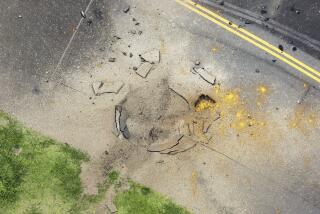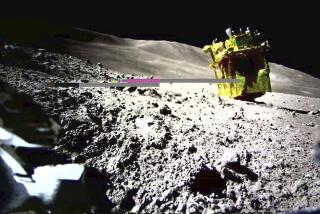U.S. Is Told to Explain H-Bomb Loss : Japan Demands to Know If Weapon Was Headed for Mainland
- Share via
TOKYO — Japan demanded today that the United States explain how a nuclear bomb 70 times more powerful than the one dropped on Hiroshima fell off an aircraft carrier in 1965 within 70 to 80 miles of a Japanese island chain.
An official of the Foreign Ministry said Japan first became aware of the incident in 1981 in a brief Pentagon report, which said a Navy A-4 attack jet carrying a nuclear bomb rolled off an elevator of the Ticonderoga in the Pacific on Dec. 5, 1965, and fell into the sea.
“The pilot, aircraft and weapon were lost” and “the incident occurred more than 500 miles from land,” the document said.
At the time, Japan did not express concern because the incident was thought to have occurred in international waters, the official said.
But on Monday, the Greenpeace environmental group cited unclassified deck logs from the Ticonderoga indicating that the warship was heading for Japan at the time of the mishap and that the bomb was lost much closer to Japanese waters than first disclosed.
William Arkin of the Institute of Policy Studies said that there have been no U.S. attempts to recover the bomb and that he feared corrosion would eventually lead to a leak and nuclear contamination.
The Pentagon’s representative in Tokyo issued a brief statement today, conceding that although “the incident occurred more than 500 miles from the Asian mainland,” the bomb was lost just “80 miles from the closest point of land--a small island in the Japanese chain.”
The high-ranking Foreign Ministry official told United Press International that Japan had used diplomatic channels to request a clarification from the United States on the reports.
“We are concerned about the reports that the incident occurred much closer to Japanese land than we were first told and are trying to determine if the Ticonderoga was headed for the Japanese mainland,” the official said.
“We also want to know if there is still a danger of the bomb leaking radiation,” he said.
More to Read
Sign up for Essential California
The most important California stories and recommendations in your inbox every morning.
You may occasionally receive promotional content from the Los Angeles Times.













